2023届高考英语形容词和副词课件课件(35张ppt)
文档属性
| 名称 | 2023届高考英语形容词和副词课件课件(35张ppt) | 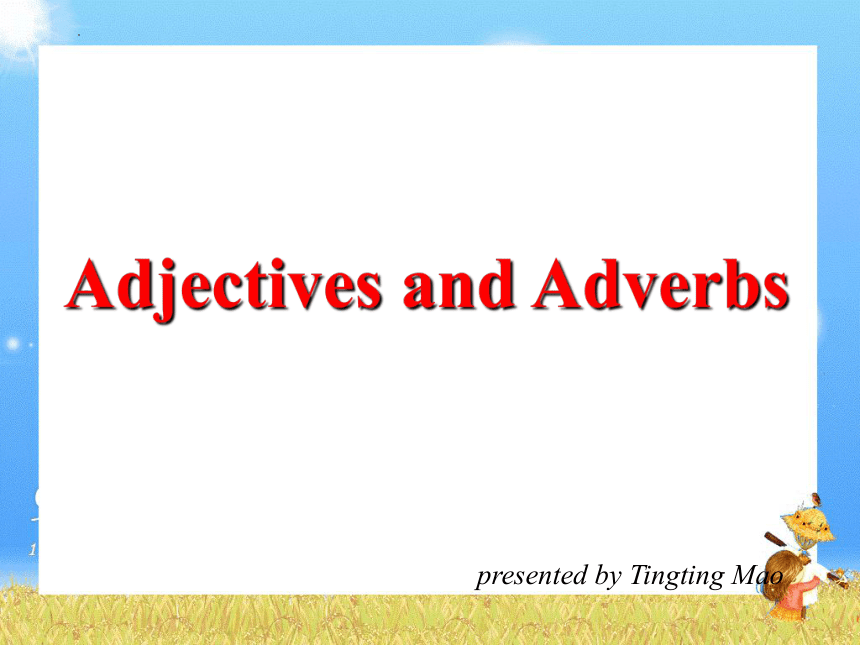 | |
| 格式 | pptx | ||
| 文件大小 | 220.1KB | ||
| 资源类型 | 教案 | ||
| 版本资源 | 通用版 | ||
| 科目 | 英语 | ||
| 更新时间 | 2022-11-13 23:15:02 | ||
图片预览




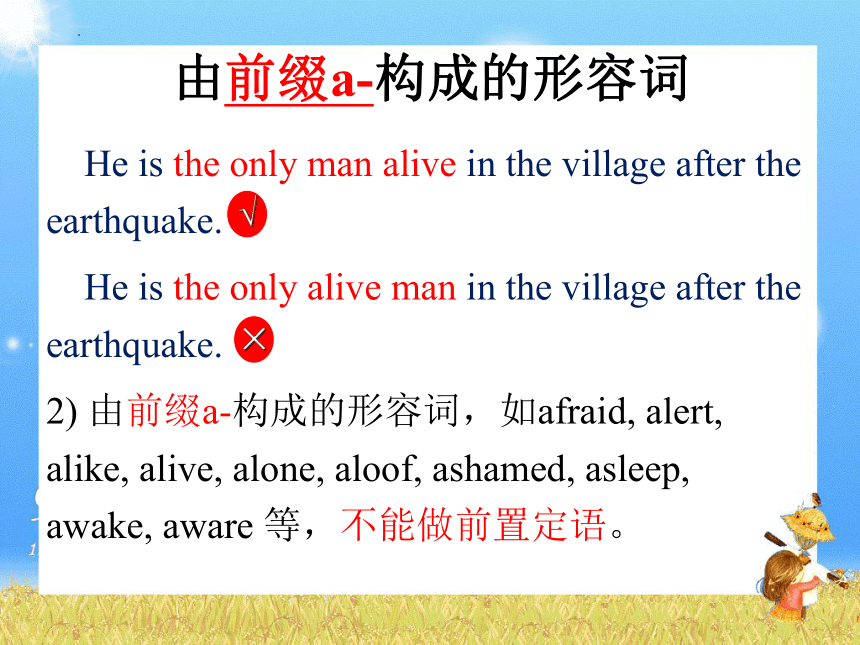
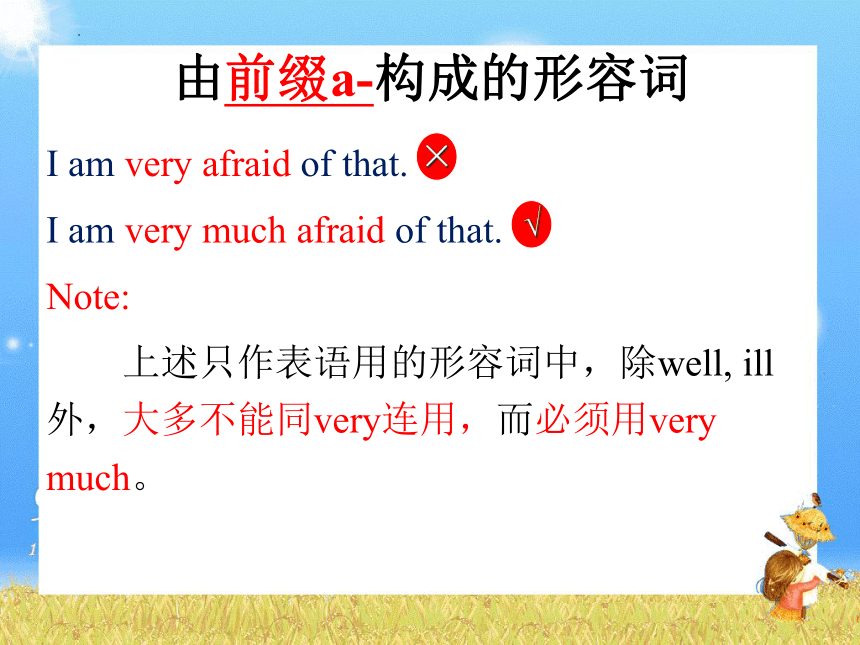

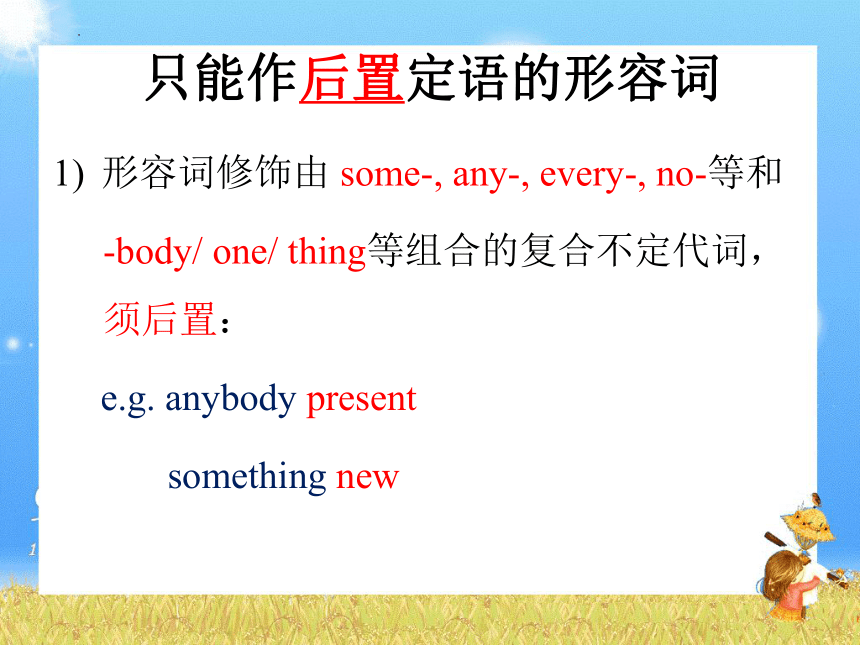


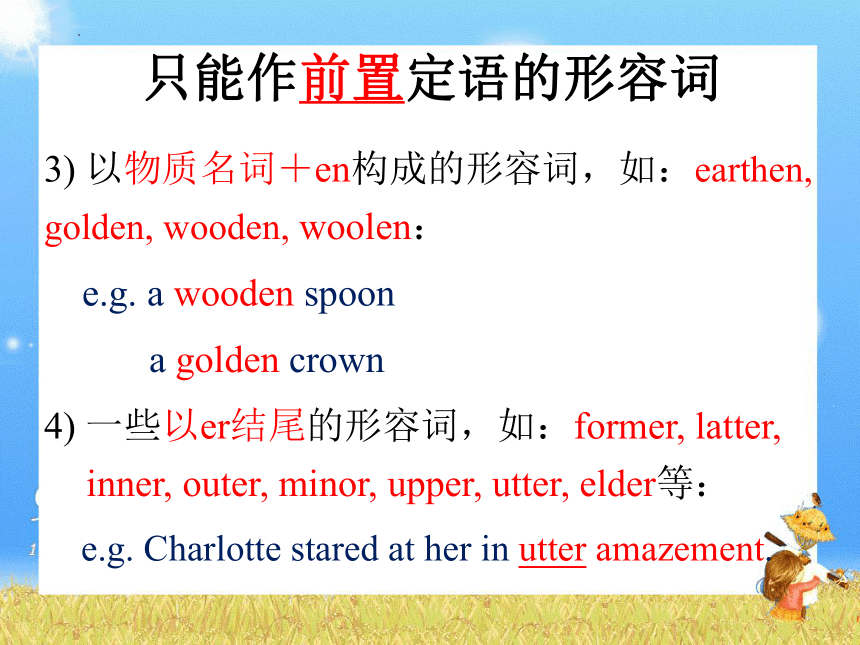

文档简介
(共35张PPT)
Adjectives and Adverbs
presented by Tingting Mao
形容词
1. 只做表语的形容词
2. 只能作后置定语的形容词
3. 只能作前置定语的形容词
只做表语的形容词
英语中有些形容词不能放在名词前面作定语,只能用作表语或后置定语,这类词语一般称作表语形容词。表语形容词分为以下两类:
表示健康状况的词,如well, ill
由前缀 a-构成的形容词。
表示健康状况的词
1. well
He is well.
He is a well man.
2. ill
He is ill.
He is an ill person.
×
√
×
√
He is a healthy man.
He is a sick person.
表语
表语
由前缀a-构成的形容词
He is the only man alive in the village after the earthquake.
He is the only alive man in the village after the earthquake.
2) 由前缀a-构成的形容词,如afraid, alert, alike, alive, alone, aloof, ashamed, asleep, awake, aware 等,不能做前置定语。
×
√
由前缀a-构成的形容词
I am very afraid of that.
I am very much afraid of that.
Note:
上述只作表语用的形容词中,除well, ill外,大多不能同very连用,而必须用very much。
×
√
由前缀a-构成的形容词
3) 前缀a-构成的形容词都不能作前置定语,但当它们本身带有副词修饰时,又可作前置定语。
e.g. a really alive student
a somewhat afraid boy
the fully awake patient
只能作后置定语的形容词
形容词修饰由 some-, any-, every-, no-等和
-body/ one/ thing等组合的复合不定代词,须后置:
e.g. anybody present
something new
只能作后置定语的形容词
Children need the best education possible.
Children need the best possible education.
2) 某些以-able 和-ible 结尾的形容词作定语时常常后置,e.g. imaginable/ possible/ available等。
这些词作后置定语修饰名词时,名词前常可以有形容词最高级或only 等限定词作为前置定语。
×
√
只能作前置定语的形容词
1. 词尾为-most的形容词,如:topmost, foremost, endmost:
e.g. Every profession produces its own topmost master.
2) 词尾为-en 的过去分词形容词,如:drunken, spoken, written:
e.g. They built a robot capable of understanding spoken commands.
只能作前置定语的形容词
3) 以物质名词+en构成的形容词,如:earthen, golden, wooden, woolen:
e.g. a wooden spoon
a golden crown
4) 一些以er结尾的形容词,如:former, latter, inner, outer, minor, upper, utter, elder等:
e.g. Charlotte stared at her in utter amazement.
in the preceding year
in the year preceding
1. 形容词past, appointed, desired, following, required, preceding等,可以置于名词前或后面。意思不变。
Note: 在下面两个短语中的past位置不可颠倒:
e.g. in the past month 在过去的一个月中
for a long time past 过去很长之间
√
√
There will be time enough to tell you when we meet.
There will be enough time to tell you when we meet.
2.1 enough 修饰名词时既可放在名词前,也可位于名词后。
We should wait patiently before he was old enough to shave.
We should wait patiently before he was enough old to shave.
2.2 enough 修饰形容词或副词时,应当后置。
√
√
√
×
形容词的顺序
all/ both/ such
a/an/ the/ this/ those/ your/ his/ our/ any/ some
one/ two/ three; first/ second/ third
good/ ugly/ sweet/ useful (性质、状态、质量)
big/ long/ small/ square/ round (大小、长短、形状)
young/ new/ old/ cold/ hot (年龄、新旧、温度)
red/ white/ black (colour)
Chinese/ American/ British (国籍、产地、区域)
iron/ silk/ stone/ fuel (材料)
floating/ hand-made (动名词、分词)
这些高大年轻的美国警察
these tall young American policemen
美丽而古老的欧洲大教堂城市
the beautiful old European cathedral cities
所有十个年轻力壮的中国男学生
all the ten strong young Chinese boy students
头三栋既漂亮又宽敞的陈旧英式红石头农场房子
the first three fine big old red English stone plantation houses
副词的顺序 P59
1) 地点副词 时间副词; 方式副词 时间副词;
方式副词 地点副词 时间副词 (有时时间副词也可以放在句首)
e.g. She sang beautifully in the hall last night.
Last night, she sang beautifully in the hall.
2) 具体的 笼统的,小的 大的
e.g. I visited him at seven o’clock yesterday evening.
The family threw a party in an Indian restaurant in London.
3) run/ go/ drive + 地点副词 方式副词 时间副词
e.g. The fans went home disappointedly after the match.
7. 一般说来,also放在句中 (be动词后或实义动词前) P60
e.g. A brilliant linguist, he was also interested in botany.
as well (as) = in addition (to)
as well as vs. as well
e.g. a shop that sold books as well as newspapers
The museum provides hours of fun and a few surprises as well.
much too + adj./ adv.
e.g. You are walking much too fast.
of + 不可数名词/ of a + 可数名词 =
more of a… 更像…;堪称…
e.g. Are you more of a follower or a leader
你更像跟随者呢,还是领导者?
as much of a… 称得上
e.g. The saying is as much of a truth as ever.
这格言仍然称得上是真理。
less of a… 算不上
e.g. It seems less of a threat than I’d expected.
威胁性似乎比我预料的要小。
A is to B what X is to Y P61
e.g. Food is to men as oil is to machines.
成对出现的副词词组
down and out
having no job and nowhere to live and without real hope of improving one’s situation 落魄,潦倒
e.g. It’s a novel about living down and out in London.
back and forth
moving first in one direction and then in the opposite one 来回地, 反复地
e.g. The guard walked back and forth in front of the gate.
成对出现的副词词组
by and by
(old-fashioned) after a short period 不久
e.g. It’s very likely to clear up by and by.
很可能不久要放晴了。
far and near/ near and far
referring to a very large area or distance 远近, 到处, 四面八方
e.g. The popular song rings far and near.
这首流行歌曲到处流传。
成对出现的副词词组
by and large
when everything about a situation is considered together总的来说, 大体上, 基本上
e.g. By and large our work have been successful.
out-and-out (adj.)
complete or in every way, used to emphasize an unpleasant quality of a person or thing 完全的, 彻底的, 不折不扣的
e.g. The whole project was an out-and-out disaster.
成对出现的副词词组
safe and sound
completely safe and without injury or damage安然无恙
e.g. All his sons returned safe and sound from the war.
to and fro
in one direction and then in the opposite direction, a repeated number of times 来回地; 往复地
e.g. The ship was rolling heavily to and fro.
那船晃来晃去很不平稳。
1. 以下形容词没有比较级和最高级 P63
beautiful, absolute, chief, entire, eternal, excellent, final, infinite, inevitable, main, naked, perfect, possible, primary, right, simultaneous, sufficient, supreme, unanimous, unique, universal, utter, vital, whole, wooden, wrong
2. 以-ior结尾的形容词,没有比较级和最高级,如anterior, posterior, superior, inferior, junior, senior, prior等 P64
e.g. That is an incident anterior to her troubles.
同级比较
as + adj. + as
not as/ so + adj. + as
表示倍数等时:
twice/ five times/ ten percent as + adj. + as
e.g. The river is twice as long as that one.
Note:
as...as与重量、数量、时间、距离、价格等形容词连用时表示‘重达...; 多达...; 高达...’
e.g. Frosts often occur as late as May.
往往到五月份还有霜。
常用表示倍数的方式
1. N times + as + adj. + as
e.g. I have three times as many as you.
2. N times + the size/ amount/ length of…
e.g. The earth is 49 times the size of the moon.
3. N times/ N% + adj./ adv. 比较级 + than
e.g. The grain output is 8 % higher this year than that of last year.
4. by + N times
e.g. The production of grain has been increased by 4 times this year.
5. N times + what
e.g. His income is 4 times what it was 5 years ago.
6. 数词 + fold表示增加到X倍或增加了X-1倍
e.g. The value of this house has increased fourfold.
这个房子的价钱已经增加了3倍了。
more的固定表达法
more A (adj. 原级) than B
sth. is like A rather than B 更加A, 但不够B
e.g. The typing is more neat than accurate.
note:
less...than... 不如
e.g. The First Lady was less known than the president.
more的固定表达法
more...than...are.... = more than 不止...
e.g. More persons than one were invited.
A is more than B
A has greater value or importance than B 不止
e.g. He is more than a coach; he is a friend.
more的固定表达法
no more than/ not more than:
emphasizing how small a number or amount is 仅仅, 不过
e.g. I have no more than two pens. P105
He was a kid really, not more than 18 or 19.
A is nothing more than B (A can be B):
emphasizing that A is only B, and nothing more interesting or important 仅仅, 不过
e.g. It was nothing more than a shower.
只不过下了场阵雨。
more的固定表达法
A is nothing less than B:
used to emphasize how important, special or attractive A is 完全是, 简直是
e.g. Courage is nothing less than indifference to hardship and pain.
勇气就是对艰难和痛苦的蔑视。
more or less:
mostly; approximately; very nearly 或多或少
e.g. I’ve more or less finished reading the book.
我差不多已经把这本书看完了。
用比较级表示最高级
比较级 + than any other + n. (单数)
比较级 + than all the other + n. (复数)
比较级 + than anyone else
e.g. John is more diligent than any other student in his class.
= John is more diligent than all the other students in his class.
= John is more diligent than anyone else in his class.
no + adj./ adv.比较级 + than
A is no + adj./ adv.比较级 + than B:
A和B同样不...
e.g. He is no younger than his wife.
= He is as old as his wife.
Tom is no wiser than John.
= Tom is as stupid as John.
can’t/ couldn’t + v. + 比较级
A can’t/ couldn’t + v. + 比较级:
A再...不过了;A 不可能更...
e.g. I can’t agree more.
= I completely agree.
He couldn’t care more. vs. He couldn’t care less.
= He absolutely cared. vs. He didn’t care at all.
Adjectives and Adverbs
presented by Tingting Mao
形容词
1. 只做表语的形容词
2. 只能作后置定语的形容词
3. 只能作前置定语的形容词
只做表语的形容词
英语中有些形容词不能放在名词前面作定语,只能用作表语或后置定语,这类词语一般称作表语形容词。表语形容词分为以下两类:
表示健康状况的词,如well, ill
由前缀 a-构成的形容词。
表示健康状况的词
1. well
He is well.
He is a well man.
2. ill
He is ill.
He is an ill person.
×
√
×
√
He is a healthy man.
He is a sick person.
表语
表语
由前缀a-构成的形容词
He is the only man alive in the village after the earthquake.
He is the only alive man in the village after the earthquake.
2) 由前缀a-构成的形容词,如afraid, alert, alike, alive, alone, aloof, ashamed, asleep, awake, aware 等,不能做前置定语。
×
√
由前缀a-构成的形容词
I am very afraid of that.
I am very much afraid of that.
Note:
上述只作表语用的形容词中,除well, ill外,大多不能同very连用,而必须用very much。
×
√
由前缀a-构成的形容词
3) 前缀a-构成的形容词都不能作前置定语,但当它们本身带有副词修饰时,又可作前置定语。
e.g. a really alive student
a somewhat afraid boy
the fully awake patient
只能作后置定语的形容词
形容词修饰由 some-, any-, every-, no-等和
-body/ one/ thing等组合的复合不定代词,须后置:
e.g. anybody present
something new
只能作后置定语的形容词
Children need the best education possible.
Children need the best possible education.
2) 某些以-able 和-ible 结尾的形容词作定语时常常后置,e.g. imaginable/ possible/ available等。
这些词作后置定语修饰名词时,名词前常可以有形容词最高级或only 等限定词作为前置定语。
×
√
只能作前置定语的形容词
1. 词尾为-most的形容词,如:topmost, foremost, endmost:
e.g. Every profession produces its own topmost master.
2) 词尾为-en 的过去分词形容词,如:drunken, spoken, written:
e.g. They built a robot capable of understanding spoken commands.
只能作前置定语的形容词
3) 以物质名词+en构成的形容词,如:earthen, golden, wooden, woolen:
e.g. a wooden spoon
a golden crown
4) 一些以er结尾的形容词,如:former, latter, inner, outer, minor, upper, utter, elder等:
e.g. Charlotte stared at her in utter amazement.
in the preceding year
in the year preceding
1. 形容词past, appointed, desired, following, required, preceding等,可以置于名词前或后面。意思不变。
Note: 在下面两个短语中的past位置不可颠倒:
e.g. in the past month 在过去的一个月中
for a long time past 过去很长之间
√
√
There will be time enough to tell you when we meet.
There will be enough time to tell you when we meet.
2.1 enough 修饰名词时既可放在名词前,也可位于名词后。
We should wait patiently before he was old enough to shave.
We should wait patiently before he was enough old to shave.
2.2 enough 修饰形容词或副词时,应当后置。
√
√
√
×
形容词的顺序
all/ both/ such
a/an/ the/ this/ those/ your/ his/ our/ any/ some
one/ two/ three; first/ second/ third
good/ ugly/ sweet/ useful (性质、状态、质量)
big/ long/ small/ square/ round (大小、长短、形状)
young/ new/ old/ cold/ hot (年龄、新旧、温度)
red/ white/ black (colour)
Chinese/ American/ British (国籍、产地、区域)
iron/ silk/ stone/ fuel (材料)
floating/ hand-made (动名词、分词)
这些高大年轻的美国警察
these tall young American policemen
美丽而古老的欧洲大教堂城市
the beautiful old European cathedral cities
所有十个年轻力壮的中国男学生
all the ten strong young Chinese boy students
头三栋既漂亮又宽敞的陈旧英式红石头农场房子
the first three fine big old red English stone plantation houses
副词的顺序 P59
1) 地点副词 时间副词; 方式副词 时间副词;
方式副词 地点副词 时间副词 (有时时间副词也可以放在句首)
e.g. She sang beautifully in the hall last night.
Last night, she sang beautifully in the hall.
2) 具体的 笼统的,小的 大的
e.g. I visited him at seven o’clock yesterday evening.
The family threw a party in an Indian restaurant in London.
3) run/ go/ drive + 地点副词 方式副词 时间副词
e.g. The fans went home disappointedly after the match.
7. 一般说来,also放在句中 (be动词后或实义动词前) P60
e.g. A brilliant linguist, he was also interested in botany.
as well (as) = in addition (to)
as well as vs. as well
e.g. a shop that sold books as well as newspapers
The museum provides hours of fun and a few surprises as well.
much too + adj./ adv.
e.g. You are walking much too fast.
of + 不可数名词/ of a + 可数名词 =
more of a… 更像…;堪称…
e.g. Are you more of a follower or a leader
你更像跟随者呢,还是领导者?
as much of a… 称得上
e.g. The saying is as much of a truth as ever.
这格言仍然称得上是真理。
less of a… 算不上
e.g. It seems less of a threat than I’d expected.
威胁性似乎比我预料的要小。
A is to B what X is to Y P61
e.g. Food is to men as oil is to machines.
成对出现的副词词组
down and out
having no job and nowhere to live and without real hope of improving one’s situation 落魄,潦倒
e.g. It’s a novel about living down and out in London.
back and forth
moving first in one direction and then in the opposite one 来回地, 反复地
e.g. The guard walked back and forth in front of the gate.
成对出现的副词词组
by and by
(old-fashioned) after a short period 不久
e.g. It’s very likely to clear up by and by.
很可能不久要放晴了。
far and near/ near and far
referring to a very large area or distance 远近, 到处, 四面八方
e.g. The popular song rings far and near.
这首流行歌曲到处流传。
成对出现的副词词组
by and large
when everything about a situation is considered together总的来说, 大体上, 基本上
e.g. By and large our work have been successful.
out-and-out (adj.)
complete or in every way, used to emphasize an unpleasant quality of a person or thing 完全的, 彻底的, 不折不扣的
e.g. The whole project was an out-and-out disaster.
成对出现的副词词组
safe and sound
completely safe and without injury or damage安然无恙
e.g. All his sons returned safe and sound from the war.
to and fro
in one direction and then in the opposite direction, a repeated number of times 来回地; 往复地
e.g. The ship was rolling heavily to and fro.
那船晃来晃去很不平稳。
1. 以下形容词没有比较级和最高级 P63
beautiful, absolute, chief, entire, eternal, excellent, final, infinite, inevitable, main, naked, perfect, possible, primary, right, simultaneous, sufficient, supreme, unanimous, unique, universal, utter, vital, whole, wooden, wrong
2. 以-ior结尾的形容词,没有比较级和最高级,如anterior, posterior, superior, inferior, junior, senior, prior等 P64
e.g. That is an incident anterior to her troubles.
同级比较
as + adj. + as
not as/ so + adj. + as
表示倍数等时:
twice/ five times/ ten percent as + adj. + as
e.g. The river is twice as long as that one.
Note:
as...as与重量、数量、时间、距离、价格等形容词连用时表示‘重达...; 多达...; 高达...’
e.g. Frosts often occur as late as May.
往往到五月份还有霜。
常用表示倍数的方式
1. N times + as + adj. + as
e.g. I have three times as many as you.
2. N times + the size/ amount/ length of…
e.g. The earth is 49 times the size of the moon.
3. N times/ N% + adj./ adv. 比较级 + than
e.g. The grain output is 8 % higher this year than that of last year.
4. by + N times
e.g. The production of grain has been increased by 4 times this year.
5. N times + what
e.g. His income is 4 times what it was 5 years ago.
6. 数词 + fold表示增加到X倍或增加了X-1倍
e.g. The value of this house has increased fourfold.
这个房子的价钱已经增加了3倍了。
more的固定表达法
more A (adj. 原级) than B
sth. is like A rather than B 更加A, 但不够B
e.g. The typing is more neat than accurate.
note:
less...than... 不如
e.g. The First Lady was less known than the president.
more的固定表达法
more...than...are.... = more than 不止...
e.g. More persons than one were invited.
A is more than B
A has greater value or importance than B 不止
e.g. He is more than a coach; he is a friend.
more的固定表达法
no more than/ not more than:
emphasizing how small a number or amount is 仅仅, 不过
e.g. I have no more than two pens. P105
He was a kid really, not more than 18 or 19.
A is nothing more than B (A can be B):
emphasizing that A is only B, and nothing more interesting or important 仅仅, 不过
e.g. It was nothing more than a shower.
只不过下了场阵雨。
more的固定表达法
A is nothing less than B:
used to emphasize how important, special or attractive A is 完全是, 简直是
e.g. Courage is nothing less than indifference to hardship and pain.
勇气就是对艰难和痛苦的蔑视。
more or less:
mostly; approximately; very nearly 或多或少
e.g. I’ve more or less finished reading the book.
我差不多已经把这本书看完了。
用比较级表示最高级
比较级 + than any other + n. (单数)
比较级 + than all the other + n. (复数)
比较级 + than anyone else
e.g. John is more diligent than any other student in his class.
= John is more diligent than all the other students in his class.
= John is more diligent than anyone else in his class.
no + adj./ adv.比较级 + than
A is no + adj./ adv.比较级 + than B:
A和B同样不...
e.g. He is no younger than his wife.
= He is as old as his wife.
Tom is no wiser than John.
= Tom is as stupid as John.
can’t/ couldn’t + v. + 比较级
A can’t/ couldn’t + v. + 比较级:
A再...不过了;A 不可能更...
e.g. I can’t agree more.
= I completely agree.
He couldn’t care more. vs. He couldn’t care less.
= He absolutely cared. vs. He didn’t care at all.
